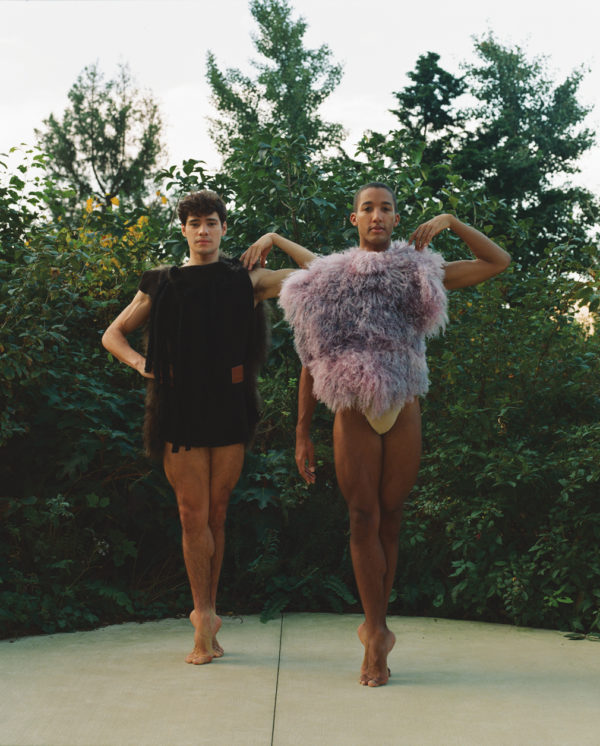
PHOTOGRAPHY BY MALIK DUPREE
JOVANI & HARPER
A conversation between the two soloists
Jovani Furlan (left) joined the New York City Ballet as a soloist in 2019. Born and raised in Brazil, 11-year-old Jovani got his start dancing at the Bolshoi Theater School in his hometown of Joinville, where the famed Russian institution has its only satellite school outside of Moscow. “I started because my grandma thought I had talent, she was like, ‘you love dancing at family barbecues so maybe you should take this test for the ballet school.’” He adds, “My party trick would be doing the splits.” Jovani also spent several years with the Miami City Ballet, first attending their school on scholarship, then joining the company and eventually being promoted to principal dancer in 2017.
Originally hailing from Dover, New Hampshire, Harper Watters (right) has been with the Houston Ballet for a decade and a soloist with the company for nearly half that time. His parents, both college English professors, signed him up for dance lessons at a young age because he had a lot of energy. “I’ve always loved attention and I’ve always been a natural performer,” he explains. Through social media and viral videos (like the one where he’s running on a treadmill in pink heels), he has also found a way to connect with a wider audience than just classical ballet lovers. “I’ve needed the self-expression that things like Instagram have given me. Being more comfortable outside the studio allows me to be more comfortable inside the studio, which then allows me to be a better dancer.”
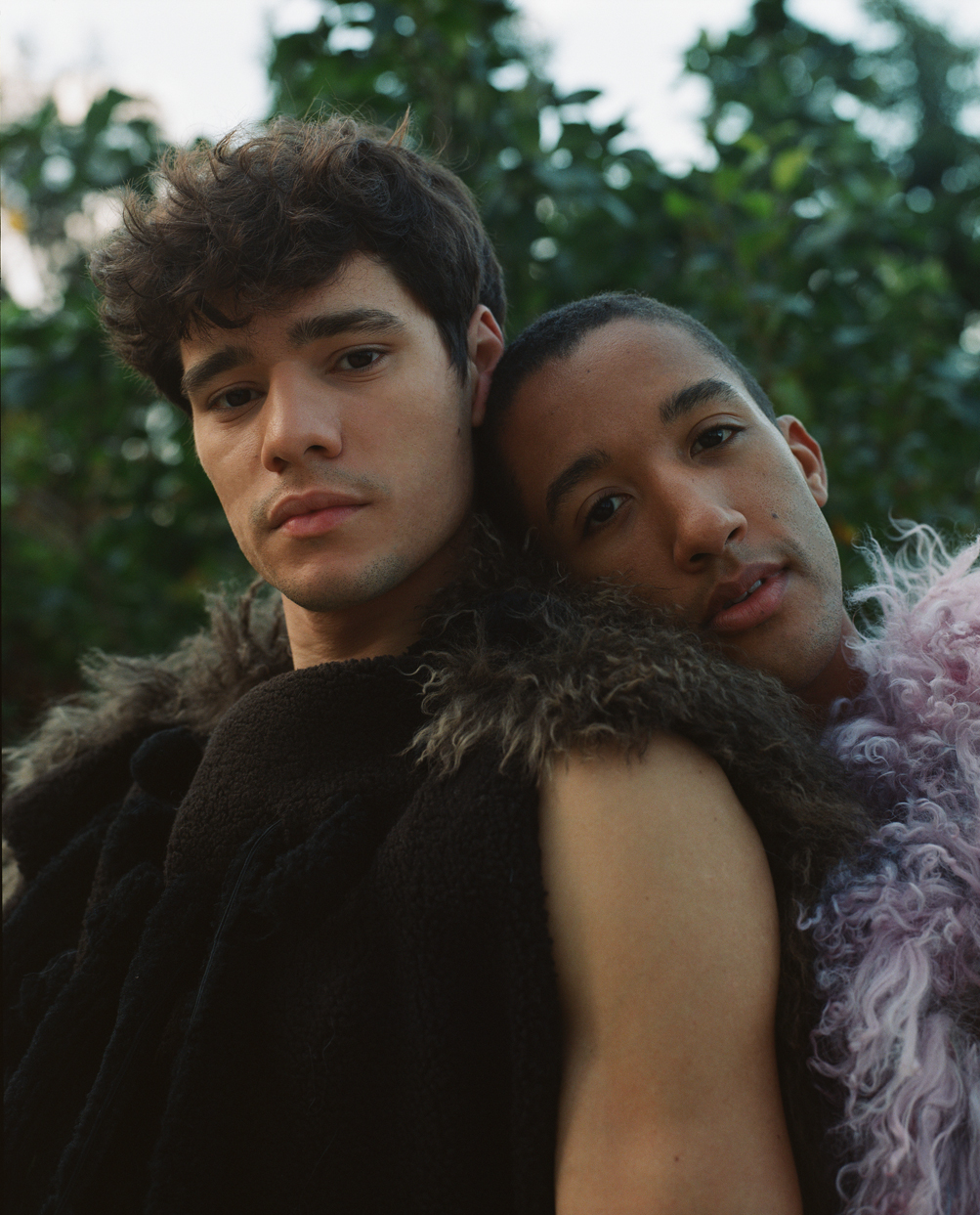
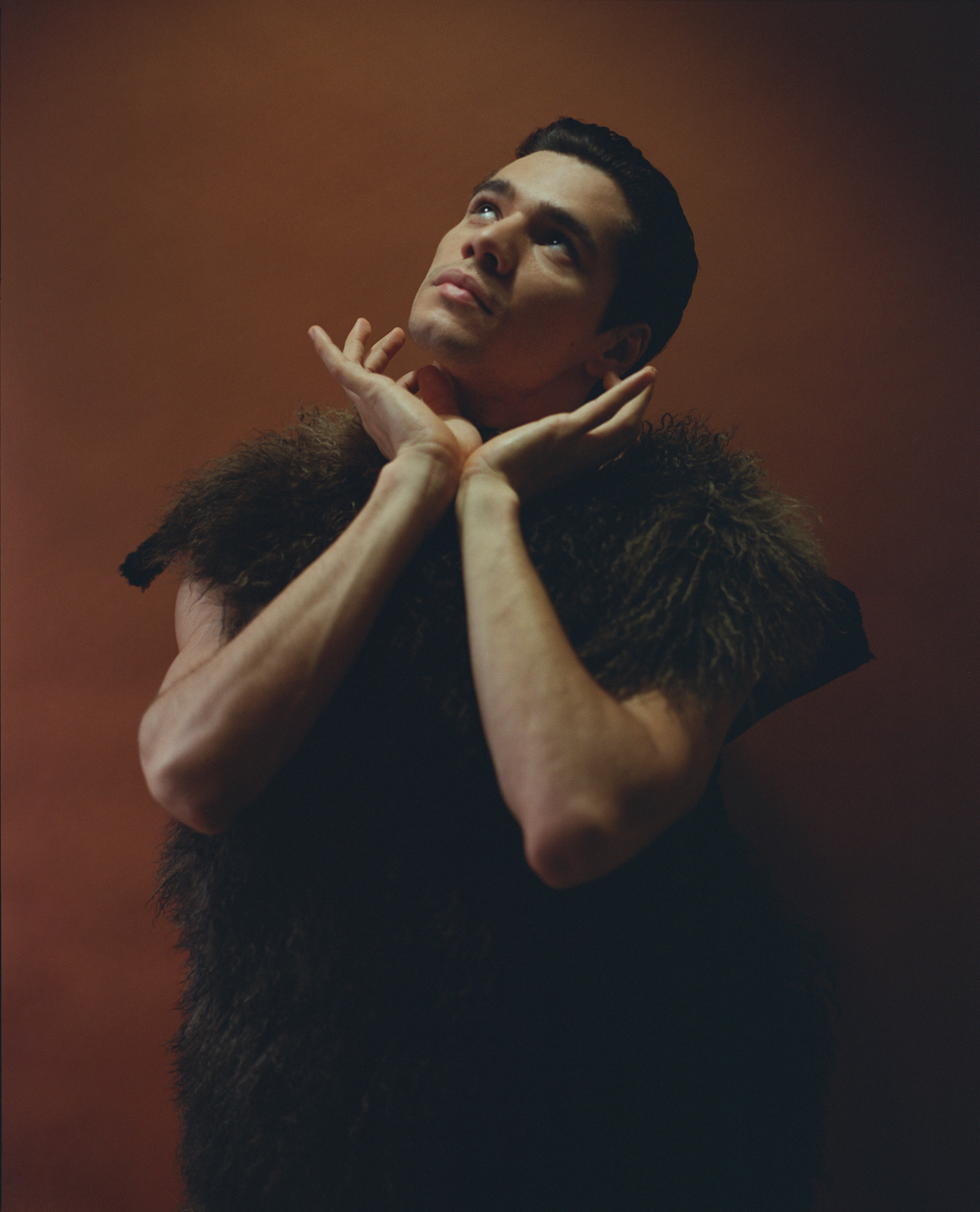 JOVANI WEARS TOP BY JW ANDERSON.
JOVANI WEARS TOP BY JW ANDERSON.
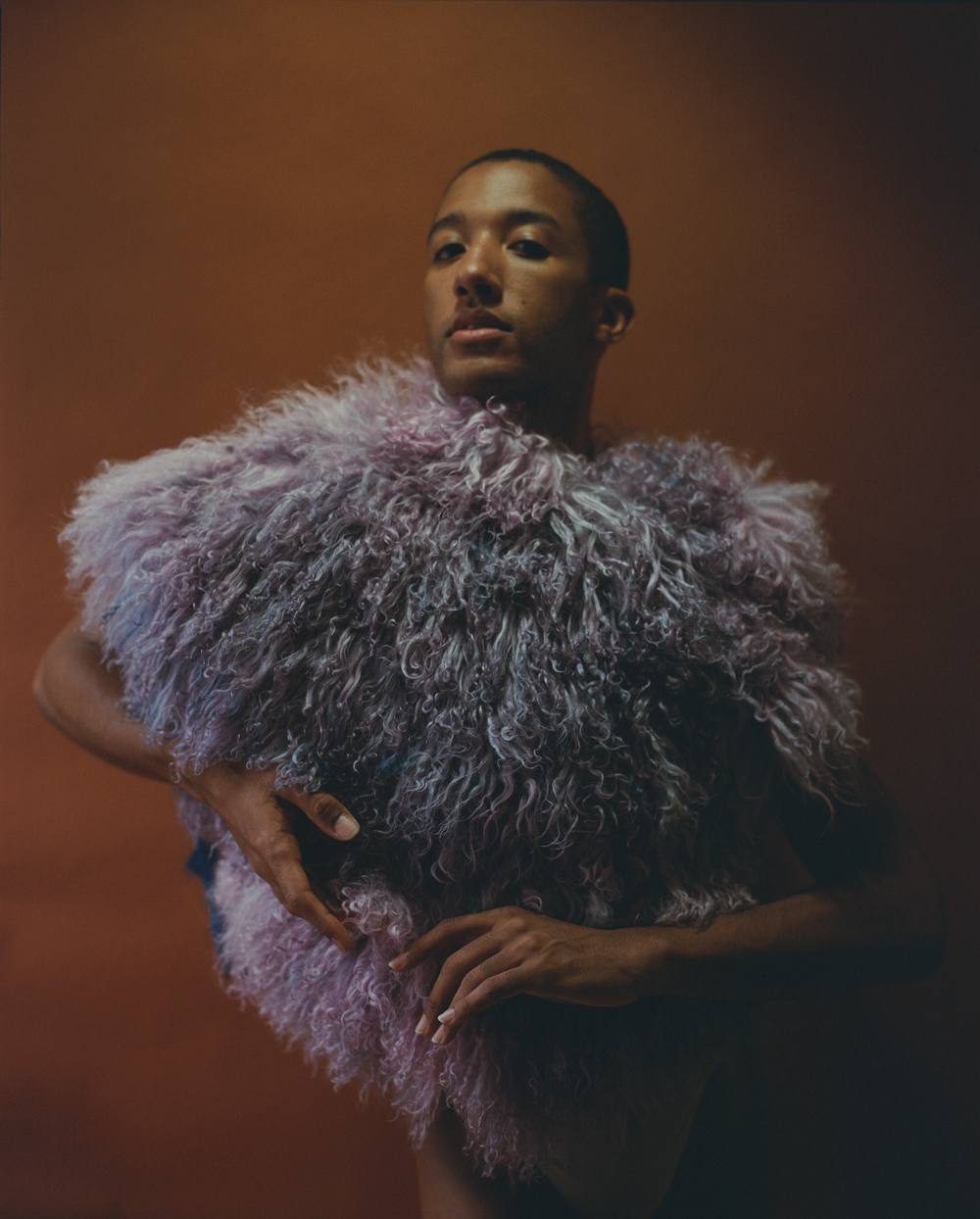 HARPER WEARS TOP BY JW ANDERSON.
HARPER WEARS TOP BY JW ANDERSON.
Did you always know you wanted to be a ballet dancer?
Harper: I was born a dancer, but I never thought that I would be a classical ballet dancer because I didn’t see people who looked like me. I loved watching MTV as a kid and I was obsessed with Destiny’s Child, but as far as professional dance companies, I thought that I had to be a modern dancer because Alvin Ailey was the only place where there were dancers of color. But in order to get to those companies you had to take a ballet audition. So I was like, “Okay, I’ll work on my ballet training. I’ll work, work, work, train, train, train.” When it started happening, I was like, “If I work my ass off, maybe I can make classical ballet a career.”
Jovani: I feel the same way. I always wanted to dance. I do love the attention, but the attention that I like is when someone tells me to do something, then I do it well. When I started dancing, I identified with the discipline of ballet immediately, with trying to be better every day.
At what age was your first date?
Jovani: I only want to consider my first gay date because I did go through a phase where I dated girls. Like I had three girlfriends.
Harper: So when you dated these girls, how sure were you of your sexuality?
Jovani: I think I was very sure. I mean looking back, I do see I had a lot of internalized homophobia. In ballet school as we got older, I would see my friends accepting their sexuality and coming out and I would be kind of mad and upset and I thought they were following the trend of everybody in the school. I was like, that’ll never be me. Looking back, I see all the things that I was repressing, I studied in that school in Brazil for seven years and only when I left and moved to Miami was I able to come out and be okay with my sexuality. I had to be away from my environment and be alone and not have other people’s influence on me. And then that’s when I went on the date that I will consider my first date. I think I was 18. It’s a really crazy story — this guy saw me at a restaurant and thought I was cute. He went and picked up my receipt and he found my name and then he found me on Facebook. I mean, he lied on the first date, he said that he found me on the Miami City Ballet website. But then later he told me it was the receipt.
Harper: That’s juicy. I feel like I was 18 too. Is that old to have your first date?
Jovani: Not in the gay world because I think we were robbed of being fully gay when we were teenagers. This is why I think gay men are so sexual — it’s because during our entire teenage years we didn’t get to live it then and want to live it all in our twenties.
Harper: I have never been with a woman. I lost my virginity to a guy. When I was 14, I came out while I was going to a private school in Maine. I was so scared to go back there that I forced my parents to let me audition for a performing arts high school. Not because I wanted to be a dancer, I just knew that there were gay people in the arts. So I went to Walnut Hill School For The Arts, I was in an all boys dorm with a lot of gay people, you know, 14, 15, 16 years old, very that energy. Things would happen in the dorm rooms. For a date, someone would be like, “Do you want to go get coffee downtown?” We would walk downtown, but it was like so stupid. It was just because we were hooking up. My first real date was in Houston. Someone messaged me on Instagram, “I’d love to take you out.” And I was like, Oh my God, I’m getting married to this person. I don’t know why. Like, even if I’m at a bar and someone comes up to me and starts talking and is like, “hey.” I’m like, “Are we dating? Like, are you the one?” It’s so bad, but still to this day I’m like that.
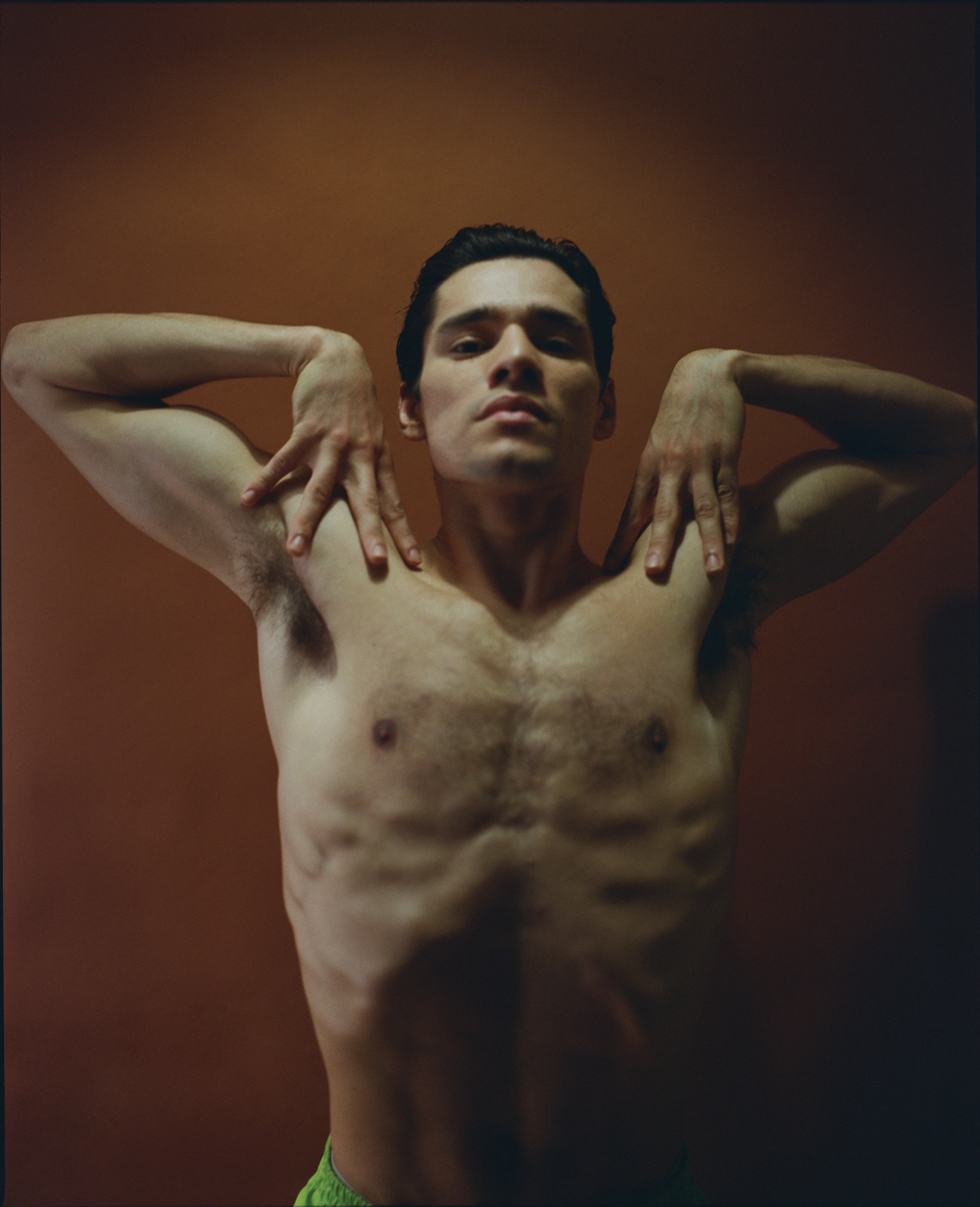 JOVANI WEARS BOXERS BY WILLY CHAVARRIA.
JOVANI WEARS BOXERS BY WILLY CHAVARRIA.
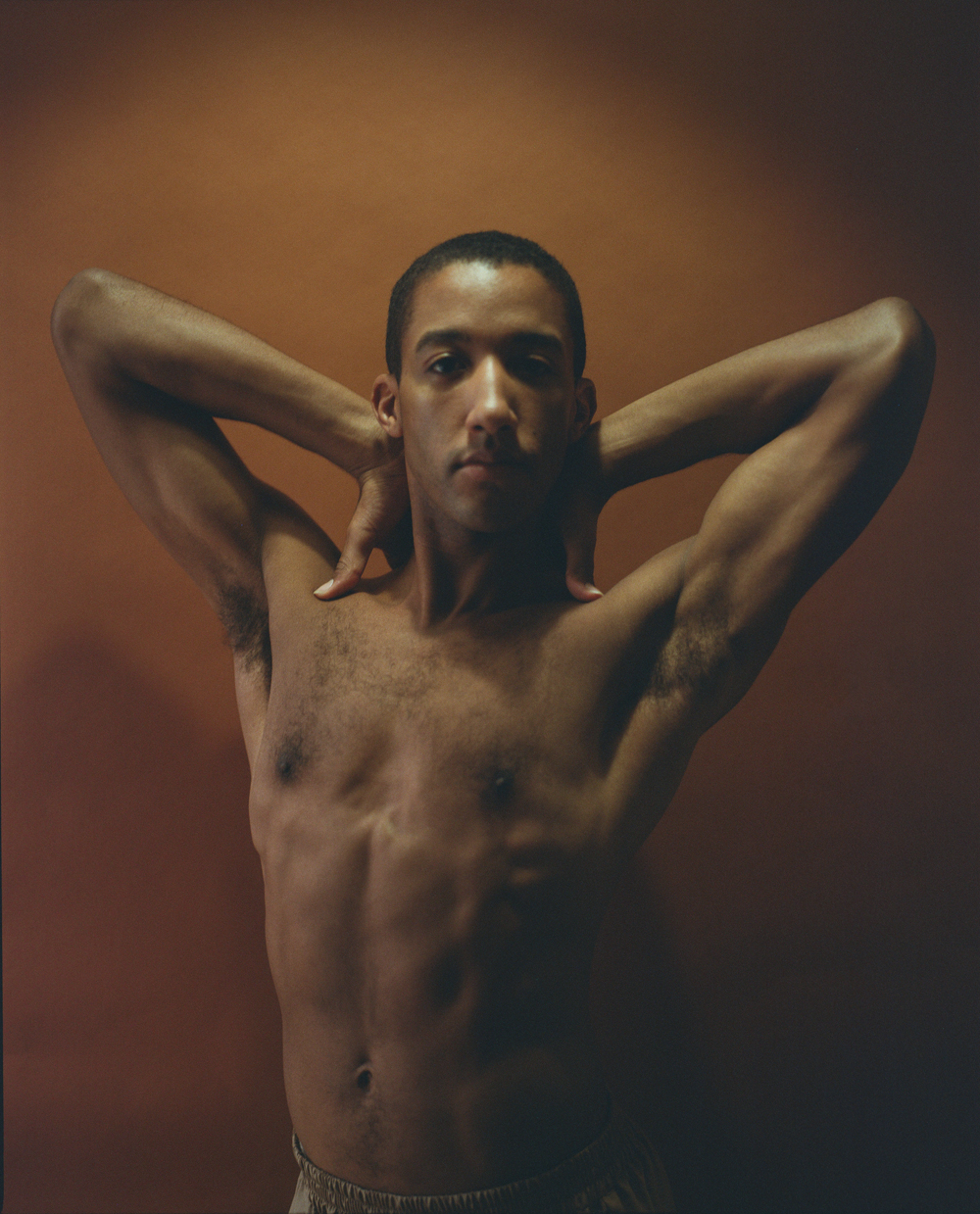 HARPER WEARS BOXERS BY WILLY CHAVARRIA.
HARPER WEARS BOXERS BY WILLY CHAVARRIA.
What has been your most memorable dancing experience?
Harper: First, there’s this ballet that Stanton [Welch] choreographed at American Ballet Theater called Clear. That’s a staple of the company. It’s really beautiful, all nude colors.Being able to dance that after watching the company do it for so many years, my first time was really special. Second, will always be dancing the prince in The Nutcracker. I never thought I was a prince. I never thought I could be a prince. It’s just the image we’re told, or shown, as what a prince should be, not even just on stage, but in the movies, in fairytales, so to be given the opportunity to say I’m a prince was very memorable. The Nutcracker is the only ballet that comes back every season and I feel like each time I do it. The role gets gayer, it feels more and more like me.
Jovani: For me every performance is memorable, so it’s really hard to pick. My debut dancing “Diamonds” at Miami City Ballet, that felt very special. I remember feeling, at the very end of the mazurka, “I have this.” I did like a developpé. I was like, “I feel like a principal.”
Harper: Okay, purr!
Jovani: Lourdes Lopez, the artistic director of Miami City Ballet, I remember right before it started, she was like, “It’s Tchaikovsky and Balanchine and you just do it.” And then when the curtain came down, she came backstage and promoted me to principal. I’ll never forget that whole evening.
Harper: That’s iconic.We just did a gala and I had to do this pas de deux with a girl — a pas de deux with a girl, obviously every pas de deux is with a girl — but it ended with a kiss and I didn’t even think twice about it. This particular performance felt so right on and I got lost in it. Well, we’re doing this ballet right now and it’s twelve men.
One of the sections is a duet for two of the guys and it is quite physical and a lot of the movements could be considered romantic. One of the dancers, he’s straight. He comes up to me and goes, “Harper, when you dance with a woman is it ever uncomfortable?” And I was like, “Why are you asking me that?” He was like, “Well, just because I’m doing the duet and it feels unnatural to me.” I was like, “You’re just now realizing that sexuality could have a little bit of an effect on how we as dancers approach our work?” I was like “Of course it’s easier for you to look at a woman and say you’re in love with them than it is for me.”
Jovani: There’s never been that opportunity for two people who identify as the same gender to be partnered together in a romantic way. So now that that’s happening when they put people that might be straight in that situation then they see what it feels like to have to embody a character that it’s not really like how you present in real life. It’s interesting to now see that [straight] guys have to navigate that.
Harper: It’s like “Welcome!”
Jovani: “Welcome! Welcome to being uncomfortable.”
How did you become a soloist?
Harper: You know the short answer is that I worked my ass off.
Jovani: That’s what I was going to say: hard work.
Harper: I’ve only danced for Houston Ballet so I only know one company, but when I joined, it was really easy to compare myself to other dancers and say, “Well, why are they getting that and I’m not getting this?” You just have to stay focused on your work and how you approach it and be aware of the response from your boss and the coaches and the choreographers. I was quick to realize that I was going to be someone who is reliable. I’m really good at picking up choreography, so I would learn everybody’s parts. Did I have to learn everybody’s parts? No, but I would so that I could be a resource. When you get to our level, everybody’s so fucking good, like everyone’s so talented that it becomes not so much about the dancing and what you’re saying with your dancing but how you approach your work. I just took that into consideration. And here I am.
Jovani: There’s nothing like hard work. You know, hard work does pay off. But most people in the ballet world work hard and not all of them make it. It makes me think of someone asking James Whiteside about the ballet world being unfair. I loved his response. He said that ballet as an art form isn’t unfair. If you work hard, you’ll get better. The people that run our careers sometimes are unfair, but it’s not ballet that’s unfair. Being in the right place at the right time plays a role too.
How did you meet each other?
Jovani: The ballet world, above all, is so small. So Nina, another Brazilian dancer like me, introduced us because she’d danced with you in Houston and then she moved to Miami and was at Miami City Ballet. When I came for a visit, we all went out to have sushi.
Harper: That was a nice restaurant. How you can be a successful dancer in a town like Miami? My God, I don’t know. I went to Twist like every single night I was there.
Jovani: So many temptations. I know we did go to Twist that night. We went to a bar and then we ended up at Twist. The rest is history.
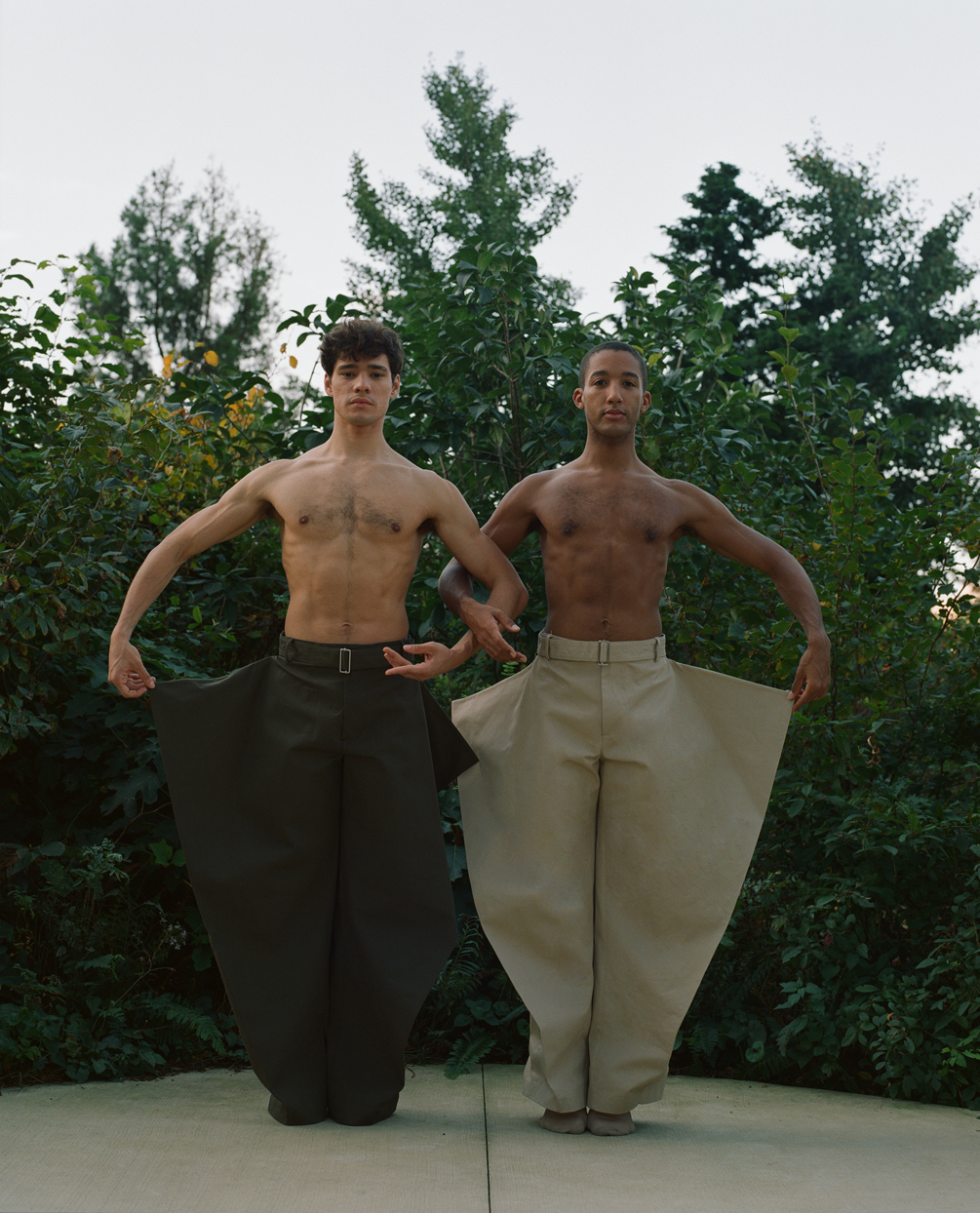 JOVANI AND HARPER BOTH WEAR PANTS BY JW ANDERSON.
JOVANI AND HARPER BOTH WEAR PANTS BY JW ANDERSON.
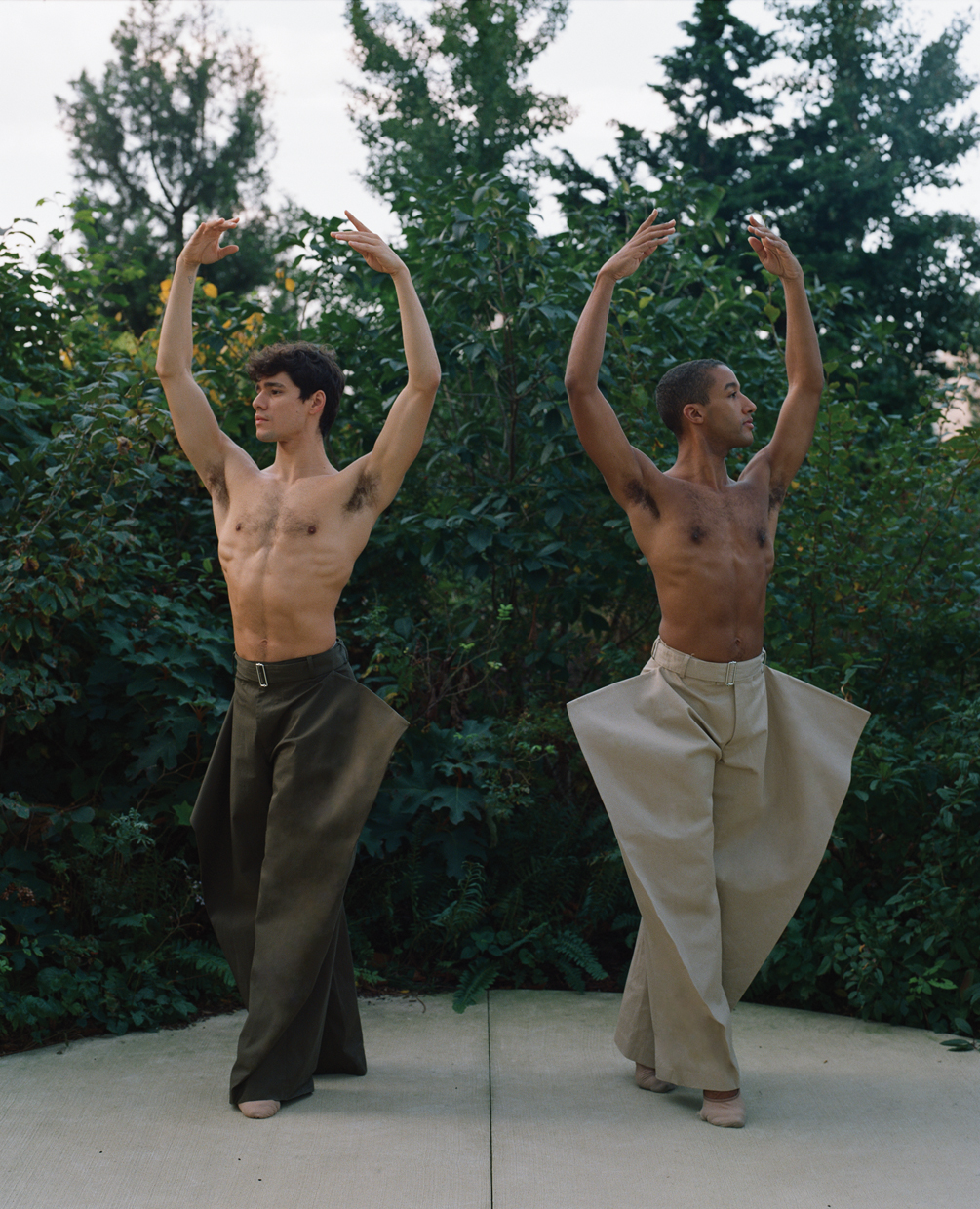
What do you have in common?
Jovani: Lots of things.
Harper: Incredible extension! Incredible bodies! We are icons, legends, and we are the moment.
Jovani: Totally unique. Never been done before. We’re both soloists. We’re both gay.
Harper: We are both nonwhite.
Jovani: We’re minorities within the world, but also within our workplace of course.
Harper: We are not the pink bow ballerina.
Jovani: We’re not cookie cutter.
Harper: I will also say that just by excelling in our careers, I think we’re both great role models for young dancers.
Jovani: I think we don’t try to fit into the mold and we’re just being ourselves, and even though you and I are very different, we’re just ourselves. We’re good role models in a sense of showing that you don’t have to be a little crystal ballerina. You can be multiple things. Whatever adds to you as a person is gonna add to you as a dancer.
Harper: We both are very disciplined.I think the definition of work hard, play hard.
Jovani: Yeah, and rest hard too, because you gotta rest hard. Work hard, play hard, rest harder.
How has your queerness influenced your career?
Harper: I think that I needed my queerness and I needed the self-expression to be the dancer that I am, because for so many years — before I joined the company, and my first few years as a company dancer — I just thought I had to be a certain type of dancer. I thought I had to be this heterosexual macho dancer, which I’m clearly not. It’s so interesting that the stereotype is that all male ballet dancers are gay, but then it’s like when I got to Houston Ballet and joined the company, I was like, “Where are the gay dancers?” Ballet is a very antiquated art form and when the people at the front of the room have an idea of what it should be, because that’s the way they were taught, trying to navigate that is difficult.
Jovani: For me, I feel like I needed dance to be able to discover my queerness. The stereotype that male ballet dancers are all gay is so backwards. At the same time, it is a safe space for people who are gay to finally come out and that’s what happened to me.
Who are you both in the ballet world? Tell us about your experiences of being people of color in the dance industry.
Harper: As ballet dancers, we start so young. So when you’re so young, you’re so focused on joining a company, you kind of put blinders on. It wasn’t until the past few years that I realized there were things that happened to me when I was younger that probably weren’t acceptable and that were certainly microaggressions — you know, about my hair, my makeup, or being told that I’m argumentative for standing up for myself. I had to learn that certain things said and done to me were in fact not appropriate. I was 15, 16 and working for this. I moved away from home when I was 14 to do this. So I was like, “Oh yeah, you’re right, I am someone who’s argumentative” when I just was sticking up for myself. This past year and a half has taught us so much and everybody’s reflecting on their actions, and how to acknowledge microaggressions and injustice. I think that there is a lot of change, but I would say that this moment also gave me a little bit of clarity. I was like, “Oh, I wasn’t going insane back then. What I was feeling was justified.”
Jovani: Maybe back then you didn’t realize it because you would have been even more traumatized. It’s almost like you’re being protected by your own unawareness of how things are not okay. Like you were saying that you didn’t think you’d ever be a prince, and you just thought that that was normal. Like that’s how it is. Princes are blonde and they have blue eyes because that’s what we were told. Duh, like, have you ever seen a Disney movie?
Harper: When I was auditioning for summer programs, I’d be the only Black person at the audition. At that age, I wasn’t like “Why am I the only black person?” I just was like, “I’m the only black person.” Now I understand that it’s an issue, and there are ways of fixing that and addressing that moving forward. How many Brazilian dancers are there in New York City Ballet?
Jovani: Oh, I’m the only one [now]. I think I’m the third one in the history of the company. But even worse is the lack of Black people in the company, because it’s not representative of a city as diverse as New York. Awareness, I think, is the first thing and then it’s coming up with actual solutions and not shallow ones, you know, let’s check the box. It’s so much deeper than that. The real work is gonna take some time.
What advice do you have for queer aspiring dancers?
Harper: Oh my gosh. Start an Instagram and run on a treadmill in pink heels and your career will go off!
Jovani: It’ll just explode, but that’s kind of like saying, running in pink heels on a treadmill can be a metaphor for you to be yourself.
Harper: Seriously, I tell people all the time, the pink heels feel like a superhero cape. There’s an energy to it and I had to learn how to bring that feeling and energy into my work as a dancer. That humor and wit. If I was a dancer 20 years ago, how comfortable would I have been to throw on heels with my friends to run on a treadmill? I felt it within me to do that. I leaned into it and I trusted it.
Jovani: Be yourself and follow your gut. If you feel like you want to do something there’s no reason not to. If you’re not harming anyone, do it. You have to work hard too and try to be a better version of who you are, but not a different version, just a better version.
Harper: I’d also say passion and career have no gender or sexuality. Something that brings you joy isn’t gay, isn’t lesbian, isn’t straight. You shouldn’t not do something for fear of coming across a certain way, that’s just silly. So whatever makes you happy and brings you joy, trust how you feel because it’s probably right.
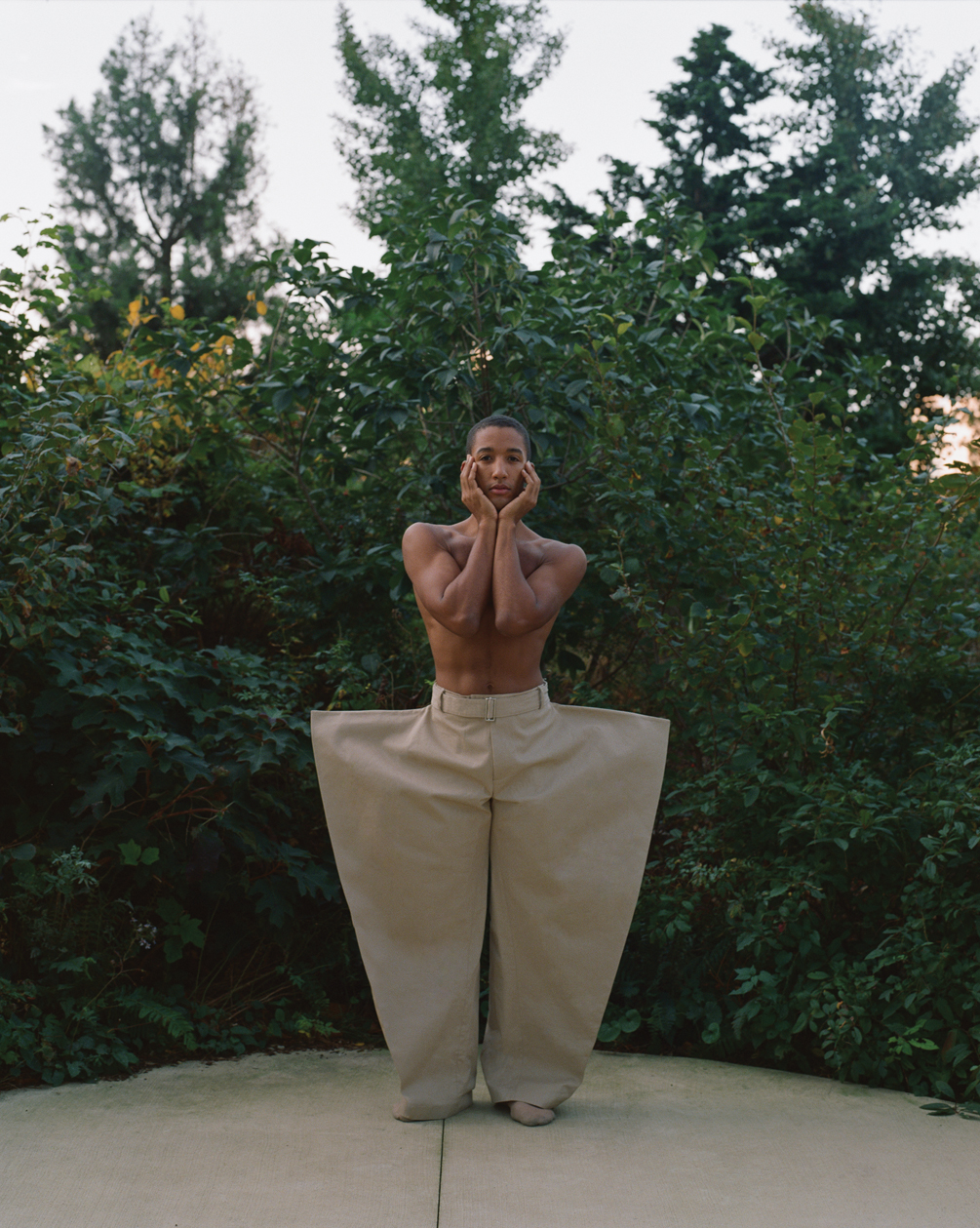
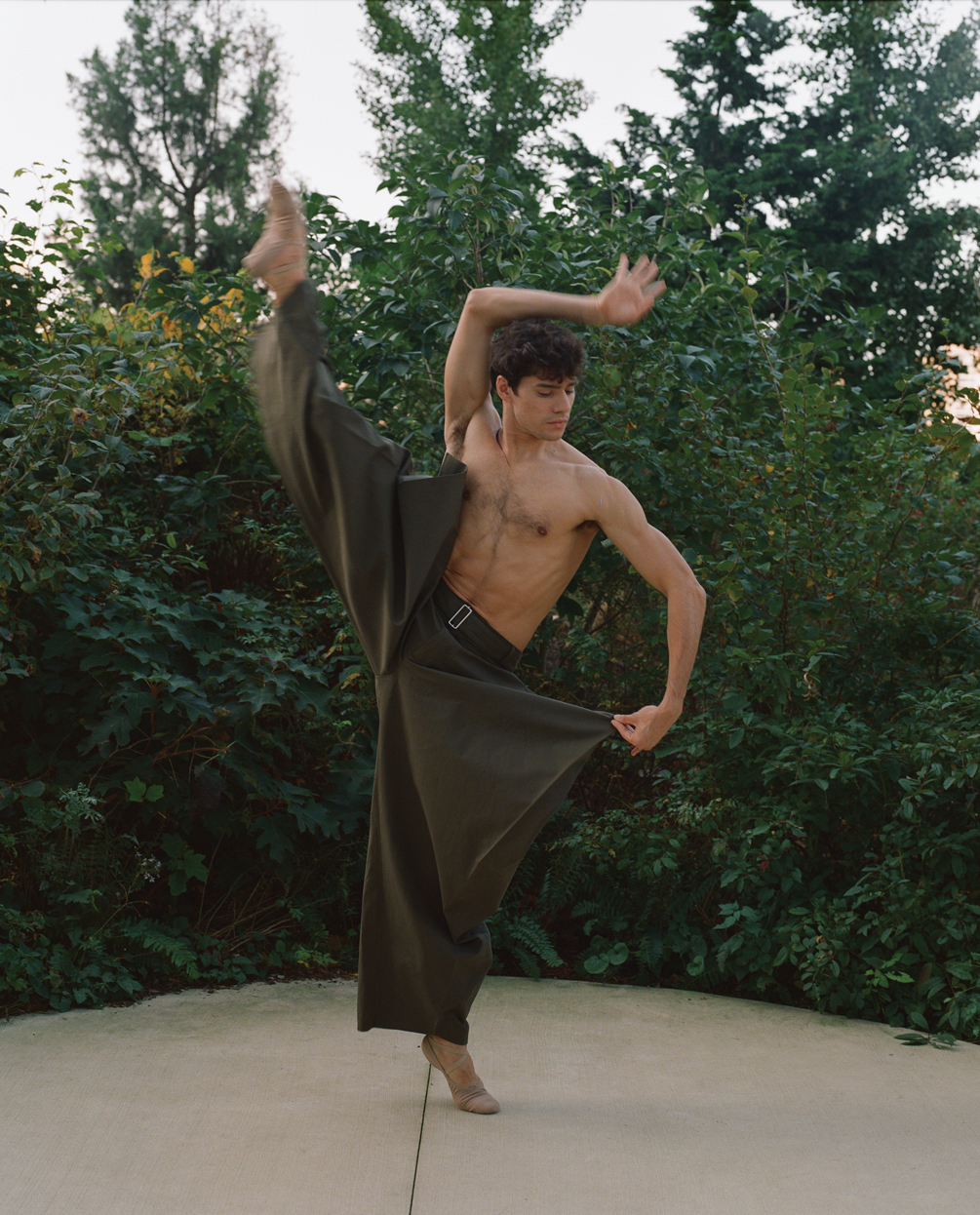
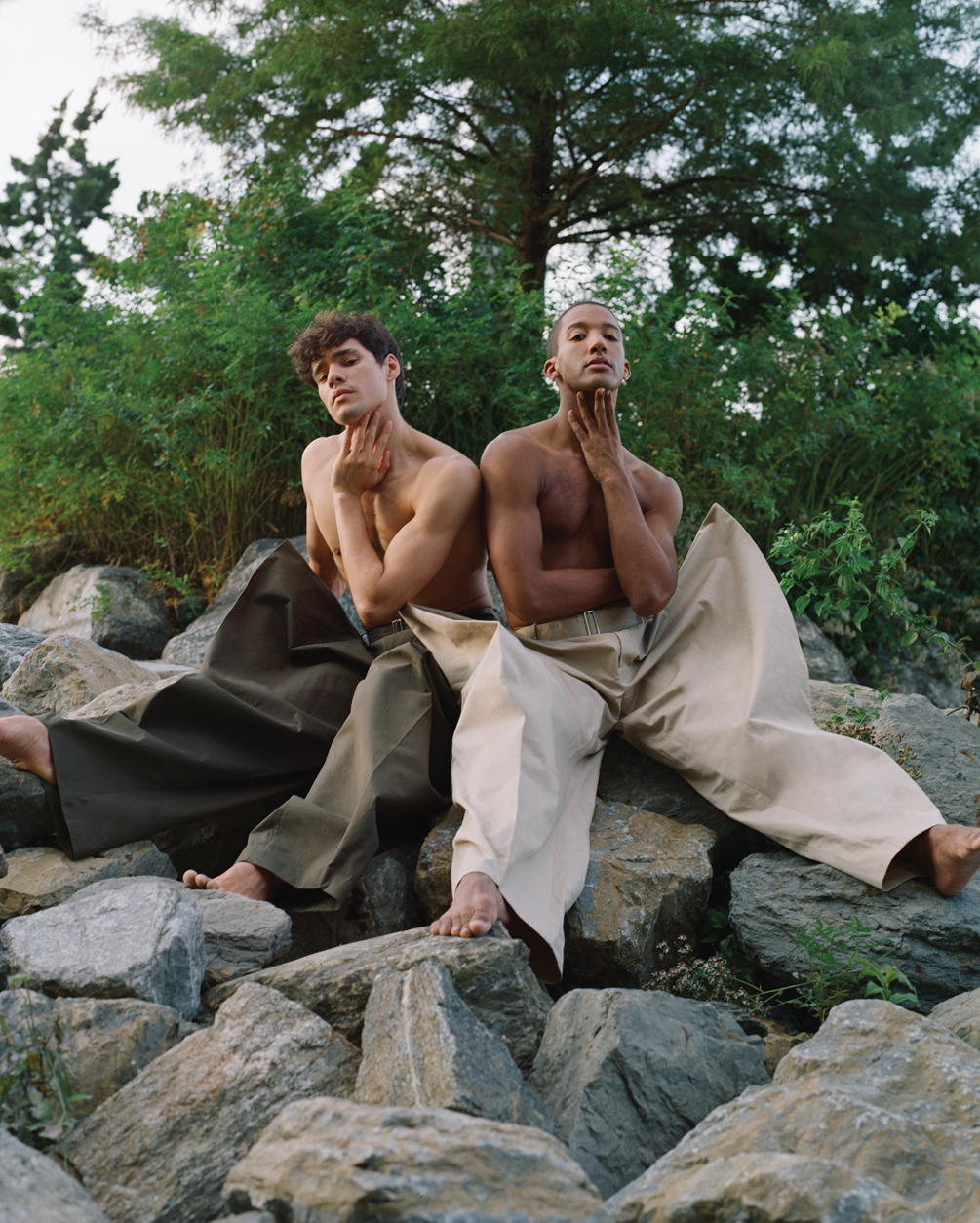 Jovani Furlan and Harper Watters photographed in Dumbo, Brooklyn, New York. October 2021.
Jovani Furlan and Harper Watters photographed in Dumbo, Brooklyn, New York. October 2021.
This story was printed in GAYLETTER Issue 15, to get a copy of this issue, click here.